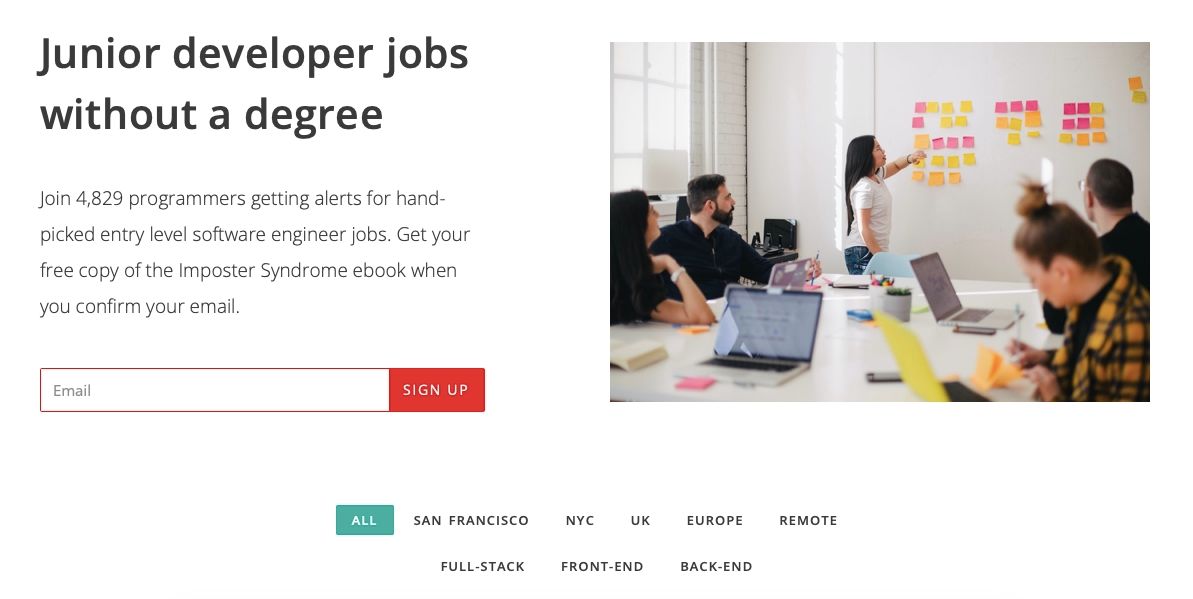Self-taught programmer Alex Kremer heads up a developer team at eBacon, a payroll SAAS company, which is almost exclusively comprised of programmers who don't have a CS degree either.
I talked to Alex about hiring developers without degrees and learning to code. In the second half of the article I also talk to Michael Tafro, a self-developer that Alex recruited. Michael discusses his self-taught code learning experience.
Hey Alex, so can you give an introduction for people who want to know more about you and what you are working on?
I am the head of technology at eBacon, and in my role I am actively coding, researching and building amazing products. When I am not at work, I volunteer at local youth coding events, meetup groups and educational websites.
How did you get your first programming job without a CS degree?
I actually did not get hired where I am at today to program. When I first came onboard at eBacon I had just finished a degree in marketing, but had spent the last 10 years toying around with coding and database work. My first job was actually to handle health insurance quoting, but I quickly found a lot of things that I didn’t want to do everyday that could be automated such as moving paper based processes into Access.
As I got more competent with our business I was given a chance to work on our vastly under serviced SAAS solution (which only had 1 user on it!). This lead me away from the pure marketing side and more into developing solutions that our internal staff and external users could use. In the 9 years that I've been at eBacon, I went from being someone who knew a little bit about coding to architecturing a brand new SAAS platform that tens of thousands of people use each month.
Do you hire self-taught developers?
With my team I do not look at college degrees as a qualification to do a specific job that needs done. A CS degree will get you through the door with a lot of recruiters, especially at bigger companies, but it is not a guarantee that you can actually be a creative person who can contribute to a team. From my perspective you really need to spend time talking to candidates and understanding where their creative abilities lie.
When you are dealing with extremely complex software such as eBacon and have to dive deep into topics such as state taxes, workers compensation and benefits you need a team that can think and learn laterally and not be hyper focused on just technology. Some of the best development hires I’ve found are because they picked up coding as a side hobby while diving deep into a core discipline such as journalism or finance.
As coding education continues to expand, I foresee students seeing coding as just another skill or elective that they learn, which could lead to more people with multidisciplinary backgrounds in coding jobs, which ultimately means better software for everyone.
Have any clients or competitors asked about your qualifications or those of your team?’
Customers do not care about your background, your teams background or what technology you use. At eBacon we solve complex problems related to time and attendance, payroll and federal regulations, and our customers pay us so that their problems and business risks are mitigated. From a coding perspective it is important to remember that everything you are doing is to solve some specific problem, there are a million ways to solve that problem, but as long as you’re making the customers life just a little bit better you’re moving in the right direction.
What are you looking for when recruiting a developer?
When recruiting, I spend a lot of time going to tech events, talking to people and building connections. What impresses me when I am looking at a hire is someone who really drives themselves to learn, and build some kind of practical solution with the tools that they have available to them. Going to your local tech events is a huge indicator of interest, if you’re actively out in the community, contributing, learning and networking, then it is showing your ability to interact with people, which is a crucial developer skill.
If you do not have a degree you may feel a little like an imposter, and this is something that is hard to shake even for really talented developers. I believe that a lot of this has to do with the unfulfilled childhood concept that, “what you study in college is what you’ll do in life,” but we all know that this isn’t true unless you’re a doctor or a nuclear physicist.
For a self taught developer or bootcamp grad you need to work hard to emphasize your other qualifications when looking at an entry level job, i.e. if you were a teacher you need to talk about how you were able to build systems around lesson plans and come up with cool new ways of showing students how history works.
Michael, can you tell us a little about yourself?
I’m a self-taught programmer who has been programming professionally for 3 years, though my interest in coding goes back to when I was a kid using our Commodore64 and then a DOS PC.
I took basic introductory classes in high school and college. And though I enjoyed solving problems with computers, I never believed I could code for a living without getting a degree in Computer Science.
After years of working in technology industries, like microprocessor manufacturing at Intel and surveillance system sales, I once again looked online to learn coding. I had taken several free courses online in the past, but they were short, isolated tutorials that didn’t leave me with any useful skill or path to continue learning.
This time I found Free Code Camp, a free online course and community that had not individual tutorials but an entire path to becoming a developer. For the first time I could see a light at the end of the tunnel, and I spent the next 18 months completing the course in my spare time.

How did you find the Free Code Camp program compared to other online coding courses?
I really enjoyed Free Code Camp. While other courses were interesting, it felt like a complete path to learning how to be a developer. I found the lessons challenging but manageable, and the excellent community was very helpful.
Did you go to any coding events and if so did that help your career?
Yes. I started going to our local JavaScript meetups once a week. I was shocked at how welcoming and helpful developers can be. It was a connection there that helped me land my first coding job. I also went to some Hackathons where I got to work on projects with much more experienced programmers.
How did you find the transition from learning to code to doing it for a living?
You’re never done learning to code. For me, it was going from learning on nights and weekends to learning full time. And now I had some of the best resources in the same office with me. The added structure was also a blessing. When learning on your own, you might be able to get by with some bad habits but being a part of a team filled in a lot of gaps in my skill set.
Do you have any advice for wannabe programmers that don’t have a degree?
Write a lot of code. Pick a project and start creating, think of ways to change it, make it better, add features. Challenge yourself to create something you don’t know how to do, and then figure it out.



